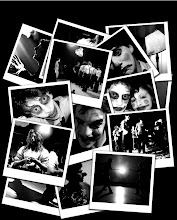 In March Belt Up begins 'The Beggar's Opera' at the York Theatre Royal, a project that promises to not only to produce a different kind of work but also challenge the way that Belt Up works. Not only do we have to get to grips with working in a much larger space than usual, the main house at the York Theatre Royal, but also working with perhaps the largest cast to date. As such the production team for The Beggar's Opera is much bigger than usual for a Belt Up show, and this is where I come in. I am Assistant Director during The Beggar's Opera and will be keeping you updated with blogs, videos and tweets throughout what promises to be an interesting rehearsal period. I thought I might use my first blog to tell you a little about myself and my Belt Up 'journey' thus far.
In March Belt Up begins 'The Beggar's Opera' at the York Theatre Royal, a project that promises to not only to produce a different kind of work but also challenge the way that Belt Up works. Not only do we have to get to grips with working in a much larger space than usual, the main house at the York Theatre Royal, but also working with perhaps the largest cast to date. As such the production team for The Beggar's Opera is much bigger than usual for a Belt Up show, and this is where I come in. I am Assistant Director during The Beggar's Opera and will be keeping you updated with blogs, videos and tweets throughout what promises to be an interesting rehearsal period. I thought I might use my first blog to tell you a little about myself and my Belt Up 'journey' thus far. My Belt Up story is perhaps one of the oldest of any of the current members of the extended Belt Up family, I have been involved now for nearly three years. Like most of us I first got involved when I was at York University. I had done lots of acting before going away to study English at University but for whatever reason it would be Easter of my first year before I finally made the decision to audition for something. I had no idea what to expect when I went to auditions for the Drama Society that term, I had no idea how they worked and no idea what shows the society was doing, so I picked the first door I came to, it was 'A Clockwork Orange' by Anthony Burgess. It seems funny to me now how uninformed this decision was, a quick look in the campus magazine or on the Drama Society website would have told me that 'A Clockwork Orange' was the latest show by 'Belt Up Theatre' and that it was in the studio of the York Theatre Royal, and that this 'Belt Up Theatre' had just been selected for NSDF '08 with 'Metamorphosis'. However I was blissfully unaware of what I was getting myself into!
So I found myself in the coolest show the society produced that summer and the coolest thing at the Edinburgh Fringe that August. I managed to land some brilliant roles in 'The Red Room' that year and made some great friends over what was perhaps one of the most hectic months ever! There was a definate excitement about that first Edinburgh, we didn't really know what we we were doing but we knew that what we were doing was different and that it mattered. Looking back it makes me laugh thinking of the effort and stress that it took to get 'The Red Room' on its feet that summer, especially if you compare it to the size and scale of the projects we now take on. The House Above for example had four spaces each more elaborate and bigger than The Red Room and took half the time to build!

Needless to say I am still here three years later and am now living with James, Dominic, Alex and Jethro and enjoying working for them and with them. Over the last few years I have; played a lecherous old fox, run through the streets of Edinburgh in the pouring rain performing a 20 minute fight sequence, nearly capsized a boat dressed as a public school boy, sacrificed myself to save my clown daughter, lived for a week as a delusional Victorian Explorer, thrown plastic balls at blindfolded members of the public whilst dressed as Luis Bunuel, got completely naked for a 'Surrealist Experiment,' spent 3 weeks underneath a railway bridge in London and climbed Arthur's Seat at night, with a large group of people whilst under the influence no fewer than 3 times. And thats only the start of it.
And now for the next part of my Belt Up Journey, being part of the Creative Team for Beggar's Opera. I am sure that like any Belt Up project there will be many more stories to come, and I will enjoy keeping you up to date over the next few months.










